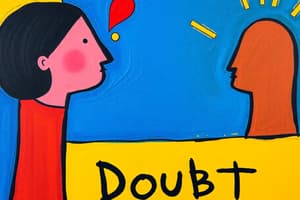Podcast
Questions and Answers
What is self-doubt also known as?
What is self-doubt also known as?
- Self-esteem
- Self-confidence
- Self-uncertainty or self-questioning (correct)
- Self-awareness
Which type of self-doubt concerns one's values or moral principles?
Which type of self-doubt concerns one's values or moral principles?
- Competence-based self-doubt
- Moral self-doubt (correct)
- Social self-doubt
- Liking-based self-doubt
What is a common cause of self-doubt?
What is a common cause of self-doubt?
- Self-awareness
- Perfectionism
- Positive self-talk
- Social comparisons (correct)
What is an effect of self-doubt on an individual?
What is an effect of self-doubt on an individual?
How can one overcome self-doubt?
How can one overcome self-doubt?
What is a characteristic of self-doubt?
What is a characteristic of self-doubt?
Which of the following is NOT a type of self-doubt?
Which of the following is NOT a type of self-doubt?
What can be a consequence of self-doubt?
What can be a consequence of self-doubt?
How can self-doubt affect an individual's behavior?
How can self-doubt affect an individual's behavior?
What is an important step in overcoming self-doubt?
What is an important step in overcoming self-doubt?
Flashcards are hidden until you start studying
Study Notes
Definition and Characteristics
- Self-doubt: a feeling of uncertainty or lack of confidence in one's abilities, judgments, or actions
- Also known as self-uncertainty or self-questioning
- Can manifest as negative self-talk, excessive self-criticism, and fear of failure or making mistakes
Types of Self-Doubt
- Competence-based self-doubt: concerns about one's abilities or skills
- Liking-based self-doubt: concerns about being liked or accepted by others
- Moral self-doubt: concerns about one's values or moral principles
Causes of Self-Doubt
- Past experiences: traumatic events, failures, or rejections
- Social comparisons: comparing oneself unfavorably to others
- Negative self-talk: repetitive negative thoughts and self-criticism
- Perfectionism: unrealistic expectations and high standards
- Fear of failure: fear of not meeting expectations or making mistakes
Effects of Self-Doubt
- Anxiety and stress: increased feelings of anxiety and stress
- Decreased self-esteem: negative impact on self-worth and confidence
- Procrastination: avoidance of tasks or decisions due to fear of failure
- Missed opportunities: holding back from taking risks or pursuing goals
Overcoming Self-Doubt
- Practice self-compassion: treating oneself with kindness and understanding
- Reframe negative thoughts: challenging negative self-talk and replacing it with positive affirmations
- Build self-awareness: recognizing and understanding one's strengths and weaknesses
- Set realistic goals: setting achievable goals and celebrating small successes
- Seek support: seeking help and guidance from trusted friends, family, or professionals
Definition and Characteristics
- Self-doubt is a feeling of uncertainty or lack of confidence in one's abilities, judgments, or actions
- Also known as self-uncertainty or self-questioning
- Manifests as negative self-talk, excessive self-criticism, and fear of failure or making mistakes
Types of Self-Doubt
- Competence-based self-doubt involves concerns about one's abilities or skills
- Liking-based self-doubt involves concerns about being liked or accepted by others
- Moral self-doubt involves concerns about one's values or moral principles
Causes of Self-Doubt
- Past experiences, such as traumatic events, failures, or rejections, can contribute to self-doubt
- Social comparisons, where one compares oneself unfavorably to others, can lead to self-doubt
- Negative self-talk, or repetitive negative thoughts and self-criticism, can foster self-doubt
- Perfectionism, or unrealistic expectations and high standards, can lead to self-doubt
- Fear of failure, or fear of not meeting expectations or making mistakes, can contribute to self-doubt
Effects of Self-Doubt
- Self-doubt can lead to increased feelings of anxiety and stress
- It can negatively impact self-worth and confidence, leading to decreased self-esteem
- Self-doubt can cause procrastination, as individuals may avoid tasks or decisions due to fear of failure
- It can also lead to missed opportunities, as individuals may hold back from taking risks or pursuing goals
Overcoming Self-Doubt
- Practicing self-compassion, or treating oneself with kindness and understanding, can help overcome self-doubt
- Reframing negative thoughts, or challenging negative self-talk and replacing it with positive affirmations, can help overcome self-doubt
- Building self-awareness, or recognizing and understanding one's strengths and weaknesses, can help overcome self-doubt
- Setting realistic goals and celebrating small successes can help overcome self-doubt
- Seeking support from trusted friends, family, or professionals can also help overcome self-doubt
Studying That Suits You
Use AI to generate personalized quizzes and flashcards to suit your learning preferences.





